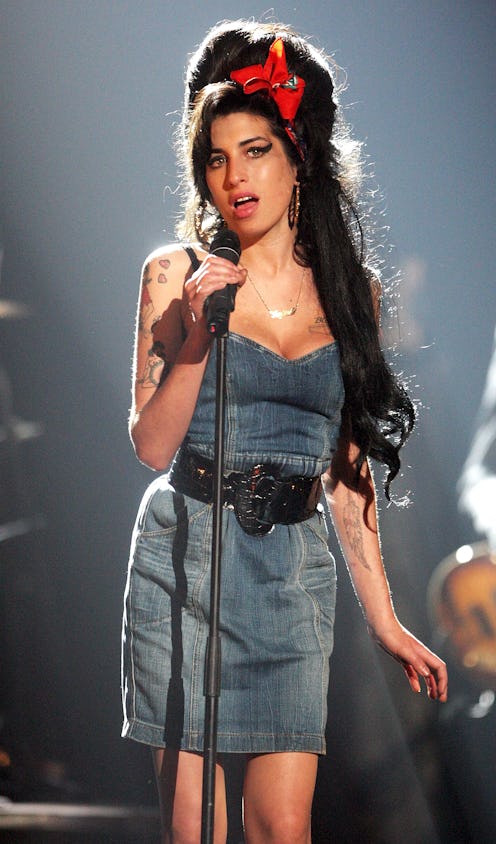Entertainment
What We Can Learn About Love From Amy Winehouse
Nearly four years after her death, Amy Winehouse is back in the news with the release of the trailer for her documentary Amy: The Girl Behind the Name. In the teaser excerpts of interviews with Winehouse are set against footage of her recording Back to Black. "I wouldn't write anything unless it was directly personal to me just because I wouldn't be able to tell the story right," says Winehouse. "I'm not a girl trying to be a star or trying to be anything other than a musician."
If it's true that Amy's work as a songwriter is directly personal, her music tells a compelling story of how relationships begin and end. Throughout her career, Winehouse recorded distinctive and memorable covers of classic love songs, including Carole King's "Will You Still Love Me Tomorrow?" (featured on the Bridget Jones: The Edge of Reason soundtrack) and Sam Cooke's "Cupid." But she also wrote some of the most compelling material on sex, loss, and starting over.
The popular narrative on Amy Winehouse paints her as a fallen girl, an addict and a trainwreck who collapsed from the pressures of fame. But she was so much more than an object lesson on addiction. She wrote as she lived — with unfettered creativity and wild abandon. Here are some of the iconic singer's lessons on love:
1. Everyone can tell when you're being shallow
"Fuck Me Pumps" plays with the stereotype of the gold digger/club-hopping party girl. On the one hand, it's clear that Winehouse mocks the money-hungry posture behind Gucci bags and surgically-enhanced breasts. On the other hand, there's also a grudging bit of admiration from Winehouse for women who are living in a — shall we say — material world:
Without girls like you there'd be no funWe'd go to the club and not see anyoneWithout girls like you there's no nightlifeAll those men just go home to their wives
By the end of the song, it's clear that she doesn't expect a finance-driven relationship to last. If you're seeing someone with only the hopes of being a famous "footballer's wife," Winehouse has a warning: You should have known from the jump that you'd always get dumped.
2. Cheating never ends well — and it will haunt you
Judging from these first two points, you'd think Winehouse was a predecessor for someone like Taylor Swift: squeaky-clean and moralistic to her core. But no. Winehouse liked her booze and her boys. In "I Heard Love Is Blind," Winehouse tries to reason with an angry partner who discovers her infidelity:
You are everything, he means nothing to meI can't even remember his nameWhy're you so upset?Baby, you weren't there and I was thinking of you when I came
The pain of betraying her guy continues to haunt her in "You Know I'm No Good," a title riddled with self-deprecation:
You say, "What did you do with him today?"And sniff me out like I was Tanqueray
Her point? Don't torture yourself with the guilt of sneaking around. It's not going to end well when you get caught.
3. Even in the most painful breakups, you'll stop crying eventually
A bad breakup can devastate us in ways that we don't expect. But as you wallow in the "why" and "what if," Winehouse urges you to remember that you won't always feel this way about your ex. Be pragmatic. This isn't going to be the last person you ever fall for. Don't worry so much, she says — next time, you'll have better judgment:
Even if I stop wanting you, and perspective pushes trueI'll be some next man's other woman soonI cannot play myself again, I should just be my own best friendNot fuck myself in the head with stupid men
(Side note: if you're planning to be "some next man's other woman soon," revisit Point #2).
4. Don't run away from experimentation
In Winehouse's world, sex is audacious. References to caning and carpet burns abound. You get the sense that physical relationships were wild, bold experiments. Sometimes she got involved with multiple people at the same time. Infidelity always lead to unhappiness, but even when relationships end in broken hearts, the storyteller of "In My Bed" remains defiant about detaching love from sex:
It's something I know you can't doSeparate sex with emotionI sleep alone, the sun comes upYou're still clinging to that notion
The association of love, sex and pain continued in "Back to Black," but so did her determination to go her own way at all costs. In the end, her pride led her down some dark roads, but you get the sense she wouldn't have changed the relationships, even if she could:
And I tread a troubled trackMy odds are stackedI go back to black
Images: Giphy 1, 3-4; Tumblr: 2
